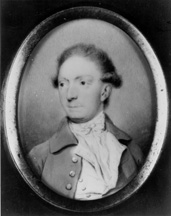William Grayson
| William Grayson | |
|---|---|
 |
|
|
United States Senator from Virginia |
|
|
In office March 4, 1789 – March 12, 1790 |
|
| Preceded by | None |
| Succeeded by | John Walker |
| Personal details | |
| Born | 1740 Prince William County, Virginia |
| Died | March 12, 1790 (aged 49–50) Dumfries, Virginia |
| Political party | Anti-Administration |
| Spouse(s) | Eleanor Smallwood |
| Alma mater | University of Pennsylvania |
William Grayson (1740 – March 12, 1790) was a soldier, lawyer, and statesman from Virginia. He was one of the first two U.S. Senators from Virginia, and belonged to the Anti-Federalist faction, he was also the first member of congress from Virginia to die while holding office.
Grayson was born in 1740 to Benjamin and Susannah (Monroe) Grayson at Belle Aire Plantation, in what is now Woodbridge, Virginia. He received his degree in Law from the University of Oxford and was knowledgeable in Latin, Greek, and English history
Grayson practiced law, principally in Prince William County, Virginia. The county seat was at Dumfries, Virginia, not far from Grayson's home as well as Belle Aire Plantation, which his brother Spence Monroe Grayson (1737–1798) inherited in 1757. On the other side of the Occoquan River lay Fairfax County, Virginia, and Grayson was also familiar with leaders of that county, especially George Mason and George Washington. Spence Grayson was ordained an Anglican priest in England in 1771, and served as rector of Cameron and Dettingen parishes in Prince William County and both brothers socialized with Rev. Scott of Pohick Church as well as Mason and Washington who were members of that church's vestry.
When the American Revolutionary War began, Grayson volunteered, and became an aide-de-camp to George Washington, Grayson rose to the rank of lieutenant colonel. In 1777, William Grayson recruited a regiment for the Continental Army known as Grayson's Regiment, and served as its colonel (and Spence as its fighting chaplain) through the Philadelphia campaign. In 1778, William Grayson served on a commission dealing with war prisoners, and in 1779 he resigned his military commission to serve on the Congressional Board of War. In 1781 he returned to Dumfries to practice law. Like many Continental Army officers, he was an original member of the Society of the Cincinnati.
...
Wikipedia
